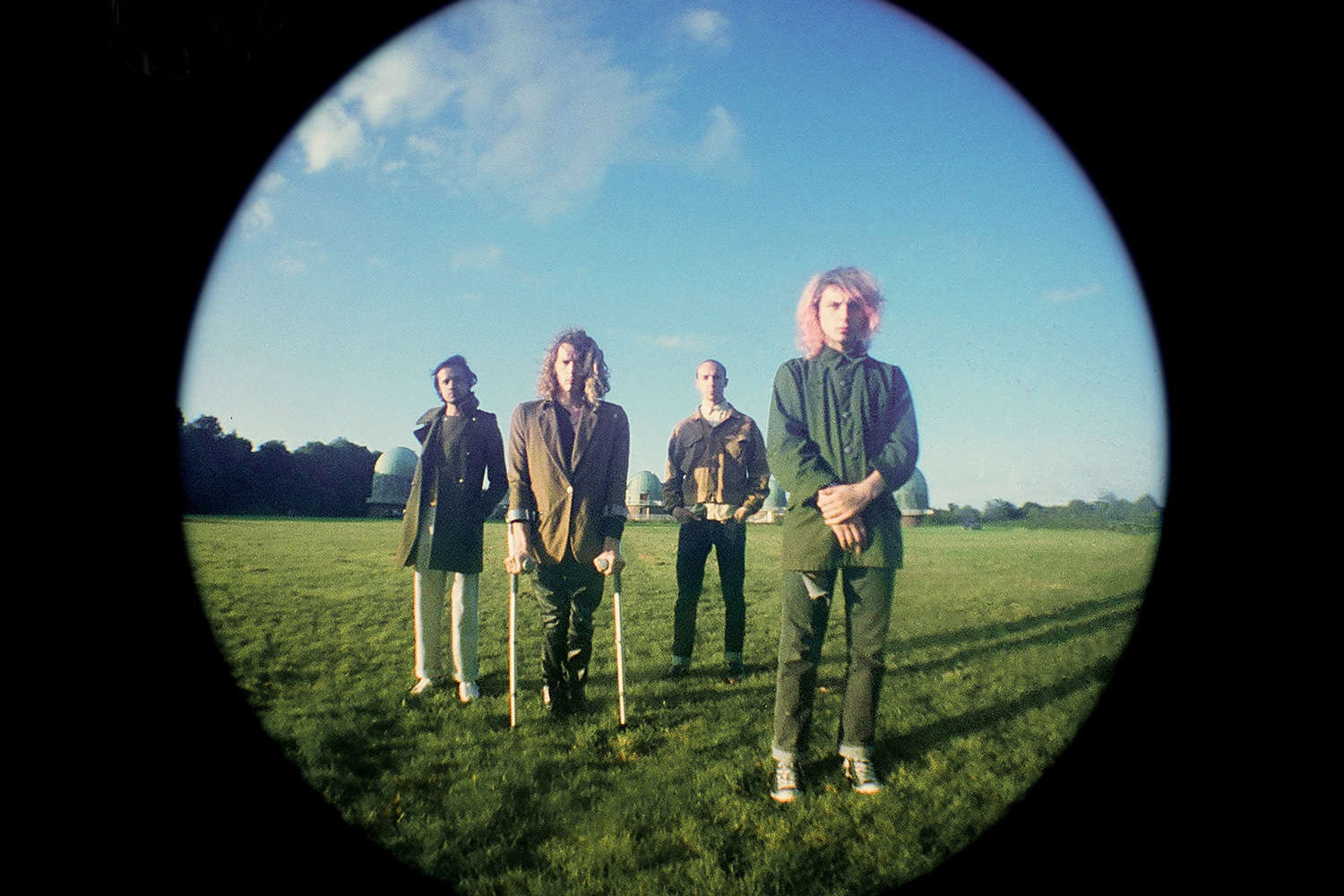It takes something special for an act to keep selling out shows nearly fifteen years into their career. This is something Mystery Jets are well aware of. Reinventing and redefining who they are with every album they’ve released, this month sees the collective look back on everything that’s made them the band they are today, and celebrate it, performing each of their five albums in full over five nights.
“We’re five records into our musical journey,” frontman Blaine Harrison enthuses. “It’s a good time to allow ourselves that glance over the shoulder at the past through the different musical landscapes that we’ve taken.” From art school enthusiasm, through pop prowess, star-spangled Americana, and beyond, no one Mystery Jets record is the same. As they begin work on album number six, there’s never been a better time to celebrate the group’s legacy.
“It’s partly to inform where it is that we should be going next with our music,” Blaine considers, “and also to give our fans from different eras a chance to re-experience the first connection they had with Jets.” Whether it was the ramshackle house parties on Eel Pie Island, the indie dancefloor anthems, the eclectic, the stratospheric, or something else entirely that first drew you to Mystery Jets, theirs is a sound that’s maintained the magic of that first connection through every evolution.
“To me growing up, bands were these guys flying in LearJets with long hair and Rolls Royces dipped in gold, and all this sort of stuff,” Blane recalls, laughing. “They were like superheroes.” Craving a musical connection of their own, this is something the group have always tried to create in everything that they do. “I’ve always felt like a great band should feel within reach,” the frontman expresses.
Rewind back to the start: with their debut album still ahead of them, Mystery Jets cut their teeth with a series of riotous house parties in their home of Eel Pie Island. “There was a unique spirit to those parties,” Blaine fondly reminisces. “It almost felt like an illegal rave, but in a rock band world, in our world.” With groups like The Libertines performing similarly chaotic shows on the other side of London, the group had “felt a calling,” and were determined to make their mark.
“I’ve always felt like live music should be this very feral thing,” Blaine expresses. “Essentially you’re giving people a space and allowing them to completely unleash themselves.” It might be over a decade since those parties took place, but every time they take to the stage the band continue to preserve that same freewheeling spirit. “I’d like to feel like our concerts still do that,” the frontman states, “in a more grown up way, possibly,” he laughs.
This is what #Jetrospective strives to immortalise, inviting fans of each record to come together and celebrate exactly what the music and the moment means for them. “The wonderful thing about live music is that as opposed to listening to a record, which is sort of enjoyed in a very isolated and personal way, live music brings all those different people together,” Blaine enthuses. “#Jetrospective felt like a way to celebrate different people forging different connections with different eras of our music at different times.”
[sc name=”pull” text=”Live music brings people together.”]
It’s not just the fans that want to re-forge these connections. “It’s really a chance to try to reconnect not only with the songs that we wrote in that time but with who the people writing those songs were,” Blaine expresses, “and to reacquaint ourselves with these versions of the people we now are.” Looking back at “songs that would probably have only come out at that specific time in our musical experience,” each record with its own unique character, through these shows there are whole worlds to rediscover.
“I’m really looking forwards to just diving in and sifting through the chaos, and trying to make some sense of it all,” the frontman adds – and there’s certainly a lot to commemorate. “I think when you start out as a band when you’re 18/19 years old, you’re very impressionable – wonderfully so,” Blaine recalls. “We wanted to be so many things,” he chuckles. Citing near simultaneous first exposures to the likes of The Coral, The Smiths, and The Cure as early sound shaping moments, ‘Making Dens’ is very much the sound of a band discovering who they are and who they want to be.
“I think the more time goes on, you find those poles within your own experience, within your own music,” Blaine illustrates. “Making that first record was like letting five art students loose in a recording studio and just going absolutely mad,” he grins. “’Twenty One’ was almost the opposite: it was an exercise in control.” Describing how “pop music had given us a call to put down the pots and pans,” this was the record that saw Mystery Jets hone their creativity and scale the rungs of success.
“People still had this pre-conceived idea of us being this oddball group of British eccentrics with their dad in the band,” Blaine considers. “Fast forward to the end of 2008 or 2009 and we really weren’t that band anymore.” Signing to Rough Trade Records for the release of their third album, Mystery Jets were raring to take their world by storm. “We were on a high after ‘Twenty One’,” the frontman conveys. “I felt like we really had an audience. ‘Serotonin’ was our chance to keep that audience engaged.”
“The first record is when you’ve had all these songs inside of you for years and years, and suddenly here’s your chance to let them all out,” Blaine portrays. “The second record is when you go on and refine your craft, and you prove that actually there’s more to you. Third records are often when people want to go out and try to reinvent the wheel.” Releasing what they describe as “a sister album to ‘Twenty One’” in the form of ‘Serotonin’, it was album four that saw Mystery Jets reset the playing field.
“We had that third record syndrome on our fourth record,” the frontman affirms. “We sat down, and we said, ‘What shall we do now? Where can we go that we haven’t been, that’s interesting, and that’s going to excite us?’” The answer was unanimous. “For a kid growing up in the UK, going to America for the first time is like going to Disneyland,” Blaine marvels. “This idea of making a record in Disneyland was just too good to turn down.”
[sc name=”pull” text=”I still get the same shivers; that’s why I’m in a band. That’s why I still do this.”]
So the band relocated to Texas. Taking up residence in a secluded ranch near Austin, filling it with equipment hired from a private collection owned by the inventor of the stealth bomber, ‘Radlands’ is as rooted in the culture of Americana as the surroundings that forged the release. “We were almost spoilt with the location that we were in,” Blaine reminisces. “It was like being on a film set.” Describing a place where “if you take the wrong turning it’s like driving into the 50s,” the album is an exploration into a new frontier.
“By the time we got back to London it felt like the band was going into a new era,” Blaine states. Taking over a disused button factory where they built a studio of their own, and recruiting a new bass player after parting ways with Kai Fish prior to the release of ‘Radlands’, Mystery Jets found themselves at the start of something brand new. “Jack [Flanagan] brought a renewed sense of the gang mentality that we had when we started out,” Blaine illustrates, “that feeling of ‘us vs. them’, of ‘We can do anything if we just stick together.’”
“For the first time since ‘Making Dens’ we had our own clubhouse,” he continues, “a place we could set everything up and have everything in one room. Songs just started coming out of it.” Writing more songs for this album than any other, with this redefinition came a renewed creativity that refuses to falter. “Now we’ve made a record that way I almost struggle to contemplate going back,” the frontman states. “I feel like it’s opened up a whole new world, and that’s very much where we’re going to be staying for a little while.”
With the band “in the studio as we speak, in the writing stages of Jets #6,” Mystery Jets’ story is far from over. “I still get the same shivers, the hairs on my arms still stand up in the same way they did when I was a kid, when Will [Rees] plays me a song for the first time,” Blaine enthuses. “That’s why I’m in a band. That’s why I still do this.” With #Jetrospective, the band are celebrating everything they’ve come to be and inviting everyone who’s been a part of the journey to revel in the moment with them.
“I just want it to feel like a celebration,” Blaine affirms. “Not just a celebration of the songs, but a celebration of the connections that people have had with those songs.” More than just a nostalgia trip, these shows act as a commemoration of where band and fans alike have come to stand right now. “It’s so much about the audience,” he adds. “It’s so much about peoples’ first experiences with that music. It’s about recontextualising those experiences in a room full of other people who have had other experiences.”
“We very quickly realised we were here because we felt like we had a dynamic connection with each other,” the frontman portrays. “I’m very fortunate to say that twelve years later I can still say the same thing.” With “the story of the Jets still very much being written,” #Jetrospective is a springboard towards whatever the future might hold. Teasing that “we’re not going to leave it so long this time,” that future might be closer than we think.
Taken from the September issue of Dork, out now. Mystery Jets play: September 25th: The Garage, London (Night 1: Making Dens); 26th: The Garage, London (Night 2: Twenty One); 28th: The Garage, London (Night 3: Serotonin); 29th: The Garage, London (Night 4: Radlands); 30th: The Garage, London (Night 5: Curve Of The Earth).





